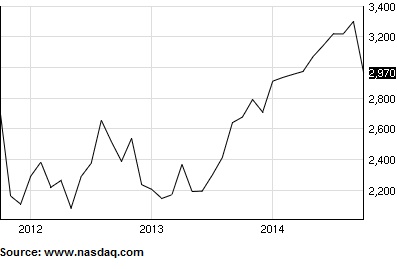Cocoa Update: Global Price, Harvests in Ivory Coast & Ghana, and Ebola
Contrary to most other (agricultural) commodities, the global price of cocoa has increased in the second half of 2014. While prices of commodities such as oil, soybeans, corn and wheat have eased due to robust global supply, and others - such as cotton - have eased amid lower global demand, the price of cocoa has been rising steadily. Despite a weak start in 2014, the cocoa price has grown over 10 percent (after having rallied around 25 percent in 2013). Main reason for this performance is the world’s rising cocoa demand.
Worldwide chocolate consumption has been rising by an average of 5 percent year-on-year (y/y) due to growing middle classes in emerging economies such as Brazil and China. Meanwhile, the size of global cocoa plantations has not risen accordingly, thus leading to higher prices in the long term. Moreover, the cocoa production is highly dependent on local circumstances, particularly the weather, in the western part of Africa. Ivory Coast and Ghana, together, account for about 60 percent of the total global cocoa supply. Although good cocoa harvests are expected in these countries, many traders have been concerned about the Ebola disease. As of yet, there have been no reports of an Ebola case in Ivory Coast and Ghana, but other (nearby) African countries (Guiney, Liberia and Sierra Leone) have been seriously affected by the Ebola outbreak.
Global Cocoa Price 2012-2014:

The International Cocoa Organization (ICCO) previously stated that the recent cocoa price hike means that the Ebola threat has already been absorbed by the cocoa price (which initially led to a five percentage point decline in the cocoa price). Provided that Ebola will not spread to Ivory Coast and Ghana (and provided that cocoa harvests in these countries are indeed as good as projected) then we may see a further decline of the cocoa price (perhaps up to ten percent) in the time ahead). Caution is advised, however, as it will only take one report of an Ebola case in Ivory Coast or Ghana to cause a soaring cocoa price. Moreover, due to all the precautionary measures (to curb the spread of the disease), it may happen that distribution channels of cocoa have affected thus leading to late shipments.
Indonesia is the world's third-largest cocoa bean producer (after Ivory Coast and Ghana). Although the country's cocoa export is an important foreign exchange earner, Indonesia misses out on added value revenues as most shipments consist of raw beans instead of processed cocoa.
Key Points:
• In the long term, the gap between global cocoa demand and supply is widening due to growing chocolate demand but limited expansion of cocoa plantations
• In the short term, the cocoa price is expected to decline due to forecasts of good cocoa harvests in Ivory Coast and Ghana
• In case of Ebola having spread to Ivory Coast or Ghana, the global cocoa price will soar suddenly
Bahas
Silakan login atau berlangganan untuk mengomentari kolom ini


